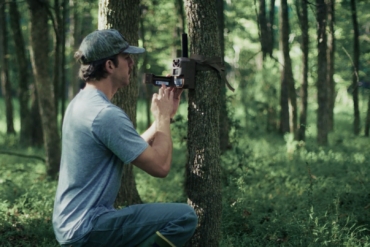A Republican Representative from Georgia has called the 85-year-old Pittman-Robertson act an attack on Second Amendment rights.
The landmark Pittman-Robertson Act is considered by many conservation organizations to be a “wildly successful” method of funding wildlife habitat management. It requires those who purchase guns, ammunition, and fishing equipment to pay excise taxes on this gear.
Now, a proposed bill, H.R. 8167, aims to undo this funding source that has effectively shepherded wildlife refuges and other public lands through nearly a century of conservation.
The “RETURN (Repealing Excise Tax on Unalienable Rights Now) our Constitutional Rights Act of 2022’’ was introduced to the House of Representatives on June 22, 2022. It proposes removing nearly all excise taxes on hunting and fishing equipment, with a handful of taxes remaining but seriously capped.
The bill’s primary sponsor, Rep. Andrew Clyde (R-Ga.), put out a press release addressing his reasons for the proposal. He said:
In case my Democrat colleagues forgot, the Bill of Rights enumerates rights to which the government cannot infringe. Unquestionably, infringement exists when the government taxes those rights to limit the people’s ability to exercise them.
The bill has 53 co-sponsors, all of whom are Republican.
What Is the Pittman-Robertson Wildlife Restoration Act?

The Pittman-Robertson Act (or the Wildlife Restoration Act) was passed in 1937 and acts as a way for hunters and fishermen to help fund conservation programs aimed at preserving the traditions in which they participate.
It placed a 10-11% excise tax on hunting- and fishing-related goods. The Department of the Treasury holds this money before being turning it over to the U.S. Fish and Wildlife Service (USFWS) to appropriate to the states.
In 2021, the Pittman-Robertson Act brought in a record-breaking $1.5 billion for conservation. It is, by far, the leading funding source for all wildlife conservation in the United States.
Because it’s user-funded, hunters, anglers, and anyone who buys shooting or fishing equipment fund the conservation programming in the US. It’s the cornerstone of the “Hunting is Conservation” movement.
To expand on funding and share the financial burden with other outdoor recreation users, there has been talk of a “backpack tax” for years. The long-debated idea is to levy a tax on outdoor gear like backpacks, tents, camp stoves, and more. But while there have been proposals, it has yet to gain any real traction.
What Does the ‘RETURN Our Constitutional Rights Act of 2022′ Propose?

This proposal is still in its infancy, but it revolves around Constitutional rights and the legality of taxing them. Rep. Clyde essentially states that inalienable rights and the products associated with those rights can’t be taxed. The claim is that it is a direct affront to the Second Amendment. Clyde said:
As assaults against Americans’ Second Amendment freedoms continue to emerge, so do treacherous threats that seek to weaponize taxation in order to price this constitutional right out of the reach of average Americans. I firmly believe that no American should be taxed on their enumerated rights, which is why I intend to stop the Left’s tyranny in its tracks by eliminating the federal excise tax on firearms and ammunition.
If the RETURN Act makes it anywhere further than where it currently sits, it will likely undergo several changes and revisions. But here are some of the things currently proposed in the bill:
- Excise taxes on firearms and ammunition repealed
- Excise taxes on bows and arrows repealed
- Limitation on tax imposed on fishing rods and poles
- 3% rate of tax for electric outboard motors
- 3% rate of tax for tackle boxes
In 2021 alone, the hunting and shooting side of Pittman-Robertson brought in a whopping $1.1 billion. John Gale, Conservation Director for Backcountry Hunters & Anglers, had this to say:
This bill is not only offensive to conservation-minded companies in the hunting and shooting sports industry that oppose such a careless waste of time in Congress, it’s an affront to hunters and recreational shooters that proudly support the legacy of Pittman-Robertson — legislation that the hunting community and gun industry leaders advocated for in the first place to give back to the wildlife resources that are the foundation of our cherished outdoor traditions.
Where Would Conservation Funding Come From?
Wildlife restoration grants account for nearly 80% of the funds used. The majority of the rest goes toward hunter education programs. Multistate grants and administration costs account for the final slice of the pie.
The wildlife restoration grants cover pretty much everything we look at as conservation. They go toward managing wildlife populations, collecting data, acquiring land for public access, restoring and maintaining wildlife habitats, and much more.
To cover those costs, Rep. Clyde suggests redirecting unallocated lease revenue generated by onshore and offshore energy development on federal lands. If that sounds familiar, it may be because the Land and Water Conservation Fund was just awarded permanent funding protection from that same source: federal oil and gas leases.
Because leases constantly change and the revenue from them is split and rerouted in countless directions, it’s hard to say for certain what amount would be left over for conservation programming.
Designating “unallocated funds” leaves a lot of question marks and gray areas. Without a dedicated funding source, it seems that available funding could waver in ways that could leave conservation behind.
As this bill is in its infancy, we will monitor its progress as it takes its first steps.








